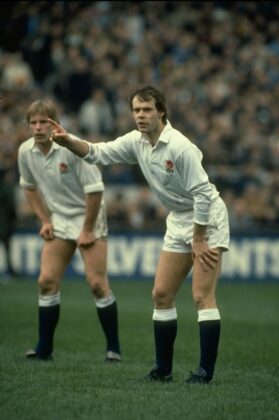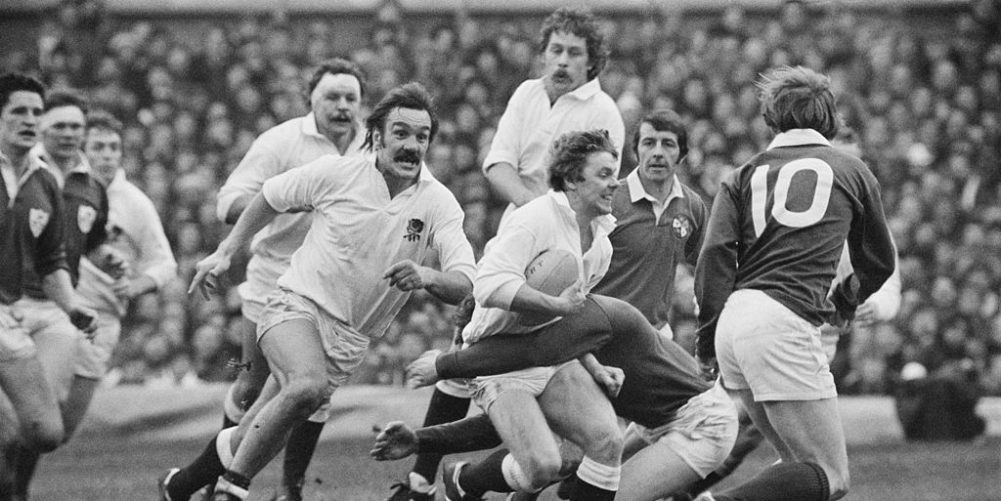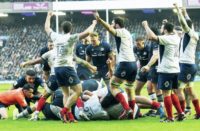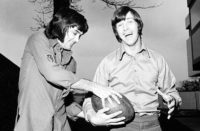SOME Grand Slams seem to count more than others, they just do, and that was certainly the case in 1980 when England beat Scotland 30-19 in a cracking finale at Murrayfield and skipper Bill Beaumont was chaired off by Fran Cotton and Tony Neary.
Last Sunday, March 15 2020, marked the 40th anniversary of a moment that was both ecstasy and deliverance. It had been 23 years since England had won a Grand Slam and in the intervening years they had won only one outright Championship. Considering the players who had appeared in the white jersey that was simply unfathomable and incredibly frustrating, especially given occasional one-off miracle Test wins in New Zealand and South Africa which hinted at so much more.
The obvious questions therefore are why 1980 and how? Bear in mind that in the final game of the 1979 Five Nations England had been taken apart in Cardiff losing 29-3 to Wales, five tries to nil. It seemed like a modern day nadir for England. Something had to change.
First and foremost a generation of terrific players but – objectively underachievers in an England shirt – decided it was now or never to right a few wrongs. Fran Cotton, Peter Wheeler, Tony Neary, Roger Uttley, Steve Smith and Dusty Hare would come into that category. If not now when?
Two important tours played their part in the summer of ‘79. First was the Lancashire tour of South Africa when augmented with a few guest ‘northerners' from other counties they played some very testing rugby by way of preparation for the North's historic win against the All Blacks at Otley.
And then there was an England XV visit to Japan, Fiji and Tonga in which new England coach Mike Davis – fresh from a couple of Grand Slam campaigns with England Schools but a novice coach at senior level – got his toes under the table. Beaumont, incidentally, went on both tours and captained both teams, a notable effort considering you also had to work for a living in those days.
Senior England players initially found Davis – a product of St Luke's College and a housemaster at Sherborne – a bit preachy and full of unfamiliar sports science jargon and buzz words. But they also recognised him as a good bloke, modest and willing to listen to key players and acknowledge mistakes.
That became evident in the Autumn when, just a week after the North had thrashed New Zealand, Uttley and Smith were left out of the England side that lost 10-9 to New Zealand. England had also picked an all singing all dancing fly-half – Les Cusworth – when with the mighty pack England had assembled a much more orthodox kicking ten would have been preferable. Costly mistakes which both Davis and his chairman of selectors Budge Rogers put their hands up to.
The opening game at Twickenham against Ireland – who had won a series against Australia down under the previous summer – started badly with new fly-half Ollie Campbell landing three penalties to make it 9-3, but then the England pack simply went into overdrive and England scored 24 unanswered points.
The new England showed their ruthless side at the dinner after the game as second row Nigel Horton recalls: “I played against Ireland because Maurice Colclough was unavailable through illness. I had a reasonably good game, but Colclough was the man in possession, and I didn't mind being dropped under those circumstances.
“However, the manner in which I was dropped was unbelievable. I was enjoying myself at the post-match banquet at the Hilton when one of the selectors came up to me and said, ‘Nige, you've been dropped'. I couldn't believe he was saying that to me on the Saturday night, rather than waiting until the Sunday morning. So, the end of my England career wasn't pleasant. I said to my wife, ‘we're leaving', and walked out.”
Two weeks later England went up another level when their eight out-muscled and out-fought the French pack at the Parc des Princes. One incident has gone down in folklore, an early scrum when legendary French hardman Richard Paperemborde and a fired-up Fran Cotton had a heated disagreement which ended with ‘Paper' being felled with some force. It cost England a penalty and three points but the French forwards were rattled, their totem pole player had come off second best, and the narrative for the game had been set. England won 17-13 with tries for John Carleton and Nick Preston and two dropped goals for John Horton.
“I apologised to Budge Rogers immediately after the game,” recalls Cotton, “but my run-in with ‘Paper' gave us a psychological ascendency over the French pack as they stood and watched their anchor man being shown no respect.
“It was quite an emotional moment coming off the pitch particularly when my great mate Steve Smith , who had played four years previously with me in Paris when France had taken us apart limb by limb, sidled over with his Burt Lancaster smile and said, ‘We can drink with the men tonight Fran'. My hangover on the Sunday morning was by some way the worst of my life.”
Then came the brutal affair against Wales at Twickenham about which acres have been written over the years. It was a disgrace and, yes, Paul Ringer was unlucky to be singled out but in rugby terms the lesson was that sometimes you have to win ugly and it's doubtful if there has ever been an uglier England win in history. Wales, reduced to 14 men, scored two tries but Dusty Hare landed three penalties on a day when Wales missed seven pots at goal.
After the Battle of Twickenham England had a full month to wait for the finale in Scotland which was timely although the Monday night training sessions at Stourbridge continued.
“That 1980 team was so committed, it was their moment and they couldn't get enough of those extra sessions at Stourbridge on Monday nights,” recalls Rogers. “It was John Jeavons Fellows' club and he organised it all splendidly. The facilities were good; it was a bloody good pitch, the squad worked like dogs and the club used to lay on a tremendous spread for the lads afterwards. John's father-in-law was a butcher and would arrive with a supply of all the best cuts for the boys, roast beef, chops, and steaks. Great fun.”
It was a tense party though that travelled north and that atmosphere was heightened on the Friday night when an RFU committee man slipped a letter under the players bedroom doors insisting that there be no repeat of the nastiness that marred the Wales game.

Clive Woodward takes up the story: “Before the match the game plan was pretty simple. Monster Scotland up front with our incredible pack, kick well, dominate territorially, press hard, force penalties and Dusty would kick the goals. Happy days.
“But come the kick-off the adrenalin was flowing and we backs started running from all parts. We turned around 19-0 up and a fuming red-faced Fran Cotton was the last to join our huddle. He was really angry. ‘Bill what happened to our game plan,' complained Fran. Priceless.”
Woodward does not exaggerate. Considering what was at stake – and remembering at this stage how various subsequent England teams have failed to close out a Grand Slam on the road – England produced a staggering first half of Barbarian-style rugby to effectively get the job done there and then. Yes, the Sots did find some form but England still ran out 30-18 winners. John Carleton score three of his seven Test tries for England in this game.
After the celebrations English rugby held its breath. Everybody hoped it would be the beginning of a new chapter, but it was actually the conclusion of an old story with the likes of Neary and Uttley departing the scene immediately, followed soon after by Fran Cotton who encountered health issues and Beaumont who had to retire after another concussion, while Phil Blakeway encountered more injury issues.
For a season or two England tantalised us. They were middling in the 1981 Five Nations but did exceptionally well to beat a strong Argentina that summer and the 1982 Championship was the one that got away.
There were excellent wins over Wales and France but they snatched defeat from the jaws of victory against Ireland, losing 16-15 at Twickenham and drew 9-9 in Scotland. The momentum had gone, the die was cast and it would be eight years before England, under Will Carling, were to be serious Championship contenders again.
“I started to lose out on a few important selection calls,” recalls Davis. “As the coach I was only one voice in six in the selection process and gradually I found it very frustrating and it spoiled things a little. It had been so good during 1980. I still wanted Dusty Hare and Mike Slemen in the team. The critics said Dusty was a carthorse – he wasn't – and there was still nobody better to kick your goals. He was a badly underrated player in my opinion.
“Slem was class and when you drop a player not only do you deprive yourself of a world class player everybody in the team is suddenly back on edge.
“‘If they can drop Slem they can drop anybody'. Do that and people start playing for their places rather than doing what is absolutely right for the team. I had decided quite early on that 1982 would be my last Five Nations.
“It was a memorable spell full of incredible memories of working with great and committed individuals. As a player with England I played 16 Tests and only appeared in five winning teams. As a coach I was in charge 16 times and we won ten. It was nice to redress the balance a little.”

























